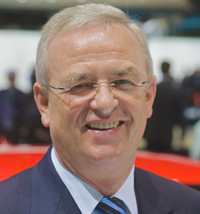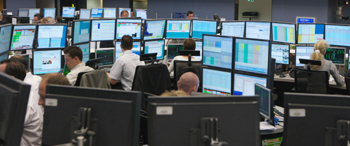Campus
Hocker is new DSW president
 Shareholder association Deutsche Schutzvereinigung für Wertpapierbesitz (DSW) elected previous chief executive Ulrich Hocker president at its members’ meeting. In relevant medias that was named a "revolution", this event of missing cooling-off shows the best example ever of what is worst practice or cybernetic auto-governance. Ulrich Hocker is (still) member of the Corporate Governance Codex Commission in Germany. The new vice-presidents are both capital-market lawyers, Daniela Bergdolt and Klaus Nieding.
Shareholder association Deutsche Schutzvereinigung für Wertpapierbesitz (DSW) elected previous chief executive Ulrich Hocker president at its members’ meeting. In relevant medias that was named a "revolution", this event of missing cooling-off shows the best example ever of what is worst practice or cybernetic auto-governance. Ulrich Hocker is (still) member of the Corporate Governance Codex Commission in Germany. The new vice-presidents are both capital-market lawyers, Daniela Bergdolt and Klaus Nieding.
IR Officers against short selling
Global corporations have a growing interest in investments in the fast-growing developing countries, and nearly one in three of these companies is considering a secondary listing in China. This is shown by a survey by BNY Mellon of 3,700 companies from 53 countries as part of the seventh “Global Trends in Investor Relations” study. About 40 percent see investor marketing in emerging markets as a strategic objective. The most important financial centres here are New York, London, Boston and Hong Kong. The vast majority of both U.S. as well as non-American companies are calling for additional supervision regulations for high-frequency trading, ‘dark pools’ (anonymous trading platforms), short selling and hedge funds. Half of the respondents stated that short selling has a negative impact on trade worldwide in their view. 92 percent of investor-relations officers were agreed that the financial reporting of companies represents a seal of approval for corporate governance, and is therefore even more important than effective financial controls (79 percent), the independence of committees (78 percent) or the appropriate remuneration of directors (51 percent).
Capital-market risks of CEO transition
The consulting firm FTI Consulting, in its study “Communicating Critical Events - CEO Transition and Risk to Enterprise Value”, went into the question of how leadership changes are reflected in Value at Risk (VAR). In the first part of the analysis FTI interviewed 3587 portfolio managers and analysts from 37 countries. In the second part, in a three-year period from June 2007 it studied the effect of the departures of CEOs at companies with a market capitalization of more than ten billion U.S. dollars. Of 263 cases examined in 35 countries there was a change in top management at 31 percent of the companies, of which 43 percent were unscheduled. Of the new CEOs, 80 percent had no experience as corporate executives and 77 percent were recruited from their own company. Changes in top management were critical particularly since about a third of investment decisions are made subject to public perception of the CEO, and the business leader’s reputation is as important here as the company’s. For 39 percent of portfolio managers surveyed, personality was a reason to sell shares of the company. To convince investors of his strategy, a new corporate executive has according to FTI about six months’ time in the capital market.
PR Award for Winterkorn
 The German Public Relations Association (DPRG) has, jointly with the FAZ-Institut, made an International German PR Prize award to 22 companies and institutions for their strategic communications. The highest award of the German PR industry in the category of change, conflict and crisis communications went to TUI. VW CEO Martin Winterkorn was given the German Image Award for straightness, success and solidity. Deutsche Telekom achieved the highest rating in the category of innovative and creative PR.
The German Public Relations Association (DPRG) has, jointly with the FAZ-Institut, made an International German PR Prize award to 22 companies and institutions for their strategic communications. The highest award of the German PR industry in the category of change, conflict and crisis communications went to TUI. VW CEO Martin Winterkorn was given the German Image Award for straightness, success and solidity. Deutsche Telekom achieved the highest rating in the category of innovative and creative PR.
Board members rarely move to their own Supervisory Boards
 The German Stock Institute has found that only 5.5 percent of supervisory-board members in the DAX, MDAX and TECDAX between 2002 and 2011 were previously in the same company, 3.3 percent as CEO and 2.2 percent as ordinary board members. Since the enactment of the new law in 2009, only one percent of executives had moved to the Supervisory Board of the same group.
The German Stock Institute has found that only 5.5 percent of supervisory-board members in the DAX, MDAX and TECDAX between 2002 and 2011 were previously in the same company, 3.3 percent as CEO and 2.2 percent as ordinary board members. Since the enactment of the new law in 2009, only one percent of executives had moved to the Supervisory Board of the same group.
Number of CSR reports increasing
According to KPMG 95 percent of the 250 largest companies worldwide publish a sustainability report. This represents an increase of fourteen percent in the past three years. While in Britain and Japan virtually every large company publishes a CSR report, the percentage in Germany is still at 62 percent.















